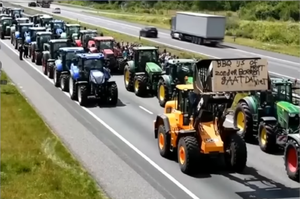Difference between revisions of "2022 Dutch farmer protest"
(tiny expand) |
(some more) |
||
| Line 9: | Line 9: | ||
|perpetrators= | |perpetrators= | ||
}} | }} | ||
| − | During summer of 2022, tens of thousands of farmers have gathered from all across [[the Netherlands]] to protest government policies which will reduce the number of livestock in the country by up to a third. | + | During summer of 2022, tens of thousands of farmers have gathered from all across [[the Netherlands]] to protest government policies which will reduce the number of livestock in the country by up to a third. Despite being barely covered in [[corporate media]], the protests have received public support and have inspired similar protests elsewhere. |
==Official narrative== | ==Official narrative== | ||
What protests? | What protests? | ||
| − | [[Corporate media]] is still waiting for a [[Freedom Convoy 2022|masked single guy with a swastika flag]] | + | [[Corporate media]] is presumably still waiting for a [[Freedom Convoy 2022|mystery masked single guy with a swastika flag]] before they will cover it. |
| + | |||
==Background== | ==Background== | ||
| − | Netherlands is [[Europe]]'s biggest meat exporter, with the highest density of livestock in Europe – more than four times that of the UK or France – with more than 100 million cattle, chickens and pigs in total. | + | Netherlands is [[Europe]]'s biggest meat exporter, with the highest density of livestock in Europe – more than four times that of the UK or France – with more than 100 million cattle, chickens and pigs in total. The government policy being protested is a 25 billion Euro investment in “reducing levels of [[nitrogen]] pollution” by paying some Dutch livestock farmers to relocate or exit the industry. In real terms, this ultimately means reducing the number of pigs, chickens and cows by about thirty per cent.<ref>https://www.theguardian.com/environment/2021/dec/15/netherlands-announces-25bn-plan-to-radically-reduce-livestock-numbers</ref> This deliberate shrinking of the farming sector will impact the livelihood of thousands of farmers, and the food supply of hundreds of millions of people. |
| − | The | + | ===The Great Reset=== |
| + | The Netherlands is host of the Global Co-ordination Secretariat (“GCS”) for the worldwide network of [[Food Innovation Hubs]]. Dutch Prime Minister [[Mark Rutte]] said on 26 January "It was great to have support for the initiative by Foodvalley members Mengniu Dairy, DSM and [[Unilever]] this week at the online WEF Davos panel session on the [[transformation of food systems]]". <ref name=expose/> | ||
| + | [[Eric Wiebes]], Dutch Minister of Economic Affairs and Climate Policy, signed a letter of intent with the [[WEF]] 8 December 2020. Amongst other things, the letter of intent states: “The Dutch innovation and [[agricultural policy]] are very much in line with the topics that are considered crucial by WEF for [[Food System Transformation]] … missions have been defined in line with the SDG addressing topics like of [[sustainability]] circular agriculture, safe, healthy and affordable food for all [[climate neutrality]] as well as [[consumer behaviour]]. There is special attention to development and implementation of key enabling technologies e.g., [[Digitalisation]], [[Artificial Intelligence]], [[Internet of Things]], [[biotechnology]] and micro and [[nanotechnology]] in the [[Big Ag|Agri-Food sector]].”<ref name=expose>https://expose-news.com/2022/07/10/documents-dutch-gov-wef-great-reset/?cmid=b0d84d30-75ee-4932-87c0-07e1dbad9da9</ref><ref>https://www.tweedekamer.nl/kamerstukken/kamervragen/detail?id=2021D50828&did=2021D50828</ref> | ||
==Protests== | ==Protests== | ||
Revision as of 02:33, 17 July 2022
 | |
| Date | 2022 |
|---|---|
| Location | Netherlands |
During summer of 2022, tens of thousands of farmers have gathered from all across the Netherlands to protest government policies which will reduce the number of livestock in the country by up to a third. Despite being barely covered in corporate media, the protests have received public support and have inspired similar protests elsewhere.
Official narrative
What protests?
Corporate media is presumably still waiting for a mystery masked single guy with a swastika flag before they will cover it.
Background
Netherlands is Europe's biggest meat exporter, with the highest density of livestock in Europe – more than four times that of the UK or France – with more than 100 million cattle, chickens and pigs in total. The government policy being protested is a 25 billion Euro investment in “reducing levels of nitrogen pollution” by paying some Dutch livestock farmers to relocate or exit the industry. In real terms, this ultimately means reducing the number of pigs, chickens and cows by about thirty per cent.[1] This deliberate shrinking of the farming sector will impact the livelihood of thousands of farmers, and the food supply of hundreds of millions of people.
The Great Reset
The Netherlands is host of the Global Co-ordination Secretariat (“GCS”) for the worldwide network of Food Innovation Hubs. Dutch Prime Minister Mark Rutte said on 26 January "It was great to have support for the initiative by Foodvalley members Mengniu Dairy, DSM and Unilever this week at the online WEF Davos panel session on the transformation of food systems". [2]
Eric Wiebes, Dutch Minister of Economic Affairs and Climate Policy, signed a letter of intent with the WEF 8 December 2020. Amongst other things, the letter of intent states: “The Dutch innovation and agricultural policy are very much in line with the topics that are considered crucial by WEF for Food System Transformation … missions have been defined in line with the SDG addressing topics like of sustainability circular agriculture, safe, healthy and affordable food for all climate neutrality as well as consumer behaviour. There is special attention to development and implementation of key enabling technologies e.g., Digitalisation, Artificial Intelligence, Internet of Things, biotechnology and micro and nanotechnology in the Agri-Food sector.”[2][3]
Protests
References
- ↑ https://www.theguardian.com/environment/2021/dec/15/netherlands-announces-25bn-plan-to-radically-reduce-livestock-numbers
- ↑ a b https://expose-news.com/2022/07/10/documents-dutch-gov-wef-great-reset/?cmid=b0d84d30-75ee-4932-87c0-07e1dbad9da9
- ↑ https://www.tweedekamer.nl/kamerstukken/kamervragen/detail?id=2021D50828&did=2021D50828